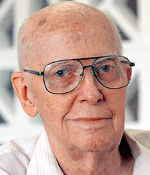 By STEWART ELLIOTT Scripps Howard News Service April 26, 2005
My experience seems fairly common. By dirt and gravel roads we walked two miles to school, but we cut the distance in half by walking through fields. After heavy rains, a swollen creek spoiled our shortcut until our father built a rickety footbridge for us. Then our mother worried about the bridge. The typical school was about 25 or 30 feet wide and perhaps 50 or 60 feet long. There were two rows of desks on each side of a broad aisle. Desks were spaced close enough for you to drop chewing gum down the collar of the one in front of you, or flip paper wads across the aisle when the teacher's back was turned. The teacher's desk was front and center with a long bench seat before her/him for seating during recitation. A coal-burning heating stove was usually in a front corner. Attendance usually varied from about 10 or 12 to 20 or more, with only one teacher. A local school board ran the system and hired teachers. My father was sometimes a member of the board. That never bought us any favor. Teachers had to be of sterling character, for they were paid $50 or $60 per month, or even more. They were not allowed to use tobacco, but we had one male teacher who hid his pipe in the coal house behind the school. Most of our fathers chewed tobacco, and we boys dared each other to try chewing in front of the teacher without getting caught. I hated the taste and never used tobacco, but once got sick from trying to smoke a cigar. We studied physiology, geography, arithmetic, orthography (the structure of words), ancient history and American history, and state history as a separate subject. We brought lunch in a brown bag or lunch box; usually a sandwich, often peanut butter or meat, or on Monday a piece of Sunday's fried chicken. Study periods were called "books," broken by "recess" play periods, when we played tag or baseball. In winter, it was snowball fights or skating. If the teacher could sing, school started with a couple of songs from the "Little Golden Book." Lower grades learned from the older children, as there was no privacy. Water was pumped from a well, and unless you brought your own cup, all drank from the same cup. With no running water, all schools had outdoor toilets. Boys in one area, girls in another, each with a privacy wall. Frequently, on Friday afternoons, we had class games, like spelling contests, or "ciphering" matches; timed mathematical races. Sometimes against visiting schools. About once a year we had a "pie supper" to raise extra money for the school. The girls and young women brought wrapped boxes of pie or other goodies that were auctioned off to the men and boys. Things did not always go well at school. We often had quarrels and even fights. Teachers could choose the punishment they thought appropriate, sometimes switching or paddling. For minor offenses, a pupil may have been told to go stand in the corner with his (it was usually boys) face to the wall, or maybe his nose in a ring drawn on the blackboard. I haven't forgotten one day when a classmate and I were caught looking out windows instead of studying our lesson. To embarrass us, we were both told to go and stand at the window. My classmate was a little brunette that I had eyes for, anyway, and that was as close as she had ever allowed me. You see, some punishment is not so painful. It is all just a matter of attitude. I suggest you show this to your grandchildren or great-grandchildren to help them appreciate our modern educational system.
|
||
